Shrek
 for mild language and some crude humor.
for mild language and some crude humor.
Reviewed by: Matthew Rees
CONTRIBUTOR
| Moral Rating: | Average |
| Moviemaking Quality: |
|
| Primary Audience: | Kids Family |
| Genre: | Animation Adventure Fantasy Romance Comedy Adaptation |
| Length: | 1 hr. 30 min. |
| Year of Release: | 2001 |
| USA Release: |
May 18, 2001 (wide) |
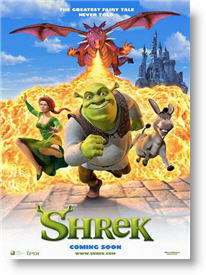
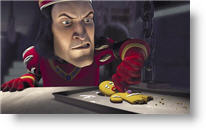
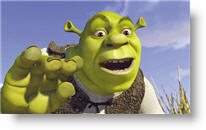
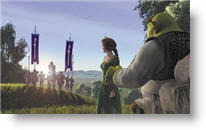
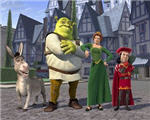
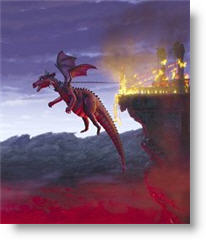
Learn about DRAGONS in the Bible
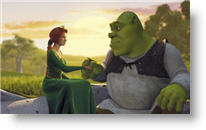
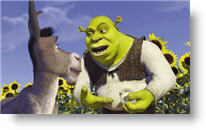
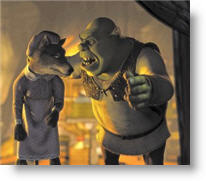
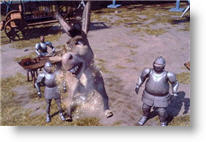
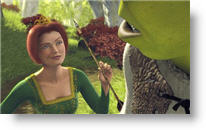
| Featuring |
|---|
| Cameron Diaz, Eddie Murphy, John Lithgow, Linda Hunt, Mike Myers |
| Director |
|
Andrew Adamson Victoria Jenson |
| Producer |
| Penney Finkelman Cox, Sandra Rabins, David Lipman |
| Distributor |
“The Prince isn’t charming. The Princess isn’t sleeping. The sidekick isn’t helping. The ogre is the hero. Fairy tales will never be the same again.”
Having been fortunate enough to see an advance screening of “Shrek”, I thought I’d share my impressions with you so you know what to expect when the movie is released on May 18th. “Shrek” is an oddball, computer-animated fairy tale spoof (think “Toy Story” meets “The Princess Bride”) from Dreamworks SKG. The title character is a large, green, ornery ogre voiced in Scottish brogue by Mike Myers—but don’t worry, this is not “Austin Powers” territory. Eddie Murphy reprises the role of wisecracking sidekick that he played so well in “Mulan”, only this time he’s a donkey, not a dragon. The principal cast is rounded out by Cameron Diaz as the feisty Princess Fiona, and John Lithgow as the egocentric and very short Lord Farquaad.
Lord Farquaad is obsessed with having the perfect kingdom, and to that end is rounding up and imprisoning fairy-tale creatures, most of whom flee to Shrek’s doorstep for protection. But to have a kingdom, you need to be a king, and Lord Farquaad decides the quickest way to kingship is to marry Princess Fiona. There’s just one small snag: she’s locked up in a tower guarded by a ferocious dragon. Enter Shrek, who’s come to have a word with Lord Farquaad about getting the unwanted squatters off his property. He agrees to rescue the princess in exchange, and he does so with characteristic directness. he’s hardly the Prince Charming that Fiona expected, but she warms up to him in time. The rest of the story can’t really be told without spoiling the movie’s surprises, but suffice it to say that it follows the time-honored trend of skewering familiar fairy-tale cliches while still managing to end happily ever after.
When all is said and done, “Shrek” is not the comic masterpiece that “The Princess Bride” was, but it’s still a very witty, very enjoyable movie. The comic timing is good, the satire is right on the mark, and the voice acting captures the characters perfectly. It helps that all the actors are totally in their element. The computer animation is top-of-the-line; would you expect any less from Dreamworks? The rock-and-roll soundtrack—opening with Smash Mouth’s “All Star” and finishing with a jazzed-up cover of the Monkees’ “I’m a Believer” by Eddie Murphy—may seem a little incongruous, but it blends well with the overall mood of the film, and isn’t bothersome unless you just don’t like that kind of music.
The main reason for the PG rating on “Shrek” seems to be a fair amount of crude humor—fart jokes, gross-out sight gags and the like. Most of this comes near the beginning of the film and serves to establish Shrek’s uncouth character. There’s a small amount of mild sexual innuendo, which is bound to go way over the heads of most children. We see a couple of very brief glimpses of Shrek’s bare buttocks and a little bit of Princess Fiona’s cleavage. I don’t recall any profanity (though I wasn’t really keeping score) except for a couple of creative wordplays using the word “ass” to refer to the donkey. There’s a moderate amount of violence, though it’s all very cartoonish. In very few cases is anybody seriously harmed, though many people get knocked around a lot. A gingerbread man is tortured by having his legs pulled off, a few forest animals meet unpleasant ends for comic effect, and one person is eaten by a dragon. We also see several skeletons of the dragon’s former victims lying around its lair.
On the positive side, “Shrek” has a lot of good, clean humor and some good messages. The biggest moral of the story is the wrongfulness of judging people by their appearance, although this is undercut somewhat by the abundance of short jokes directed at Lord Farquaad. A secondary message is the importance of companionship. All Shrek wants at the beginning of the movie is to be left alone, but he learns by the end that no man (or ogre) is an island. While there’s nothing really new or especially deep in the movie’s moral platitudes, they’re still refreshing in today’s self-centered and image-conscious society. And for children who haven’t heard them a hundred times before, they could very well make a lasting impression. With the noted caveats, I can recommend “Shrek” as one of the few movies these days that’s fun for the whole family.
See our review of “Shrek II,” “Shrek the Third,” and “Shrek Forever After”


The animation was excellent and overall I thought it was a great movie. I would see it again. I personally don’t think children under 10 should see it, as they might imitate the language. This movie needs to be seen with a sense of humor!
[Better than Average / 4½]
[Better than Average / 5]
Let me briefly explain. The hero Shrek is ridiculed because he is different from the others around him. That being said the movie goes on to show that even though he may be different on the outside, he is truly better on the inside than those who are doing the “shrek bashing “. Go see the movie it has a good message and your kids will like it and you parents will like it as well.
[Better than Average / 4½]
[Better than Average / 5]
Some films, like “The Mummy Returns”, use a storyline to simply tie together a series of special effects. But Shrek’s animations are so marvelously and delicately tied to the characters and the story that you get totally lost in the beauty of the created world on the screen before you.
The characters are delightful, but my favorite was Eddie Murphy in the role of Donkey who is a wonderful, unforgettable comedic figure.
There is one scene which may be too intense for young viewers. It is a scene of a terrifying dragon (which we later learn to love). There are a handful of mild profanities (“damn”) and two plays on the word “word” ass (referring to Donkey). This is one film you will want to see again and again!
[Better than Average]
[Excellent! / 5]
The movie-lover will enjoy Shrek for all the “inside” jokes and spoofs. The movie has a good moral of the story and the action that leads to the point is captivating, well-written, funny and simply good ole’ entertainment. I recommend this film for everyone, especially those who need a good laugh and a good bit of relaxation.
[Good / 5]
Good / 5
I do not understand where people are going with Shrek’s “Do you think he’s compensating for something?” line when he sees DuLoc for the first time. Seriously, it has to do with Farquad’s height. In a very goofy movie, I was astonished how quickly Farquad was devoured. However, this part of the movie shows justice getting accomplished on evil.
Fiona does mention she was cursed by a witch as a child, but this was shown in a negative light. Shrek is not an evil ogre, he tries to solve problems over a pint (of alcohol, but no one gets drunk; good), but is pushed over the limit when people just want to panic over thin air. I think a lot of negative commentators are just trying to find things that weren’t supposed to be in the movie.
Moral rating: Better than Average / Moviemaking quality: 3
But I have to ask myself, am I going to bring my Afro-American daughter to see this movie? Quite frankly it’s hard enough trying to help her overcome the idea of Barbie as perfection. So, I think I will definitely pass. And to be honest, I hope you do the same.
[Better than Average / 4½]
[Average / 4]
The movie had a good pace, although it had some stale dialog and forced humor at times, especially anything to do with rear ends. A very funny scene where the prince chooses his princess I thought clever and creative. Felt the music was out of place—perhaps I never relate fairy tale characters to rock and roll. A princess bride type soundtrack would have been preferred. Overall, a pretty decent movie who’s special effects made it worth watching.
[Better than Average / 4]
“Ass” was used twice with no play on words intended. Sexual “innuendo” was blatant more than once. The “damns” were loud and clear as well. The real theme of pain and isolation from physical differences was kinda chucked in near the end (trying to redeem the movie?). Great animation, but not worth the price of admission.
[Very Offensive / 2]
We should not be surprised with the past work that Murphy, Myers, and Diaz have done. Are these true “role” models for this generation. Even listening to Elton John sing some “Hallelujahs” was offensive. I disagree with the reviewer. I wish I had not taken my kids to see this one.
[Very Offensive / 4]
We too left this movie too late in hopes that it would improve, but I was sad to say that it got worse and worse as the movie went on. We as parents need to be careful that we are not sending mixed messages to our children. don’t do that or speak like that and yet we entertain ourselves with this kind of junk?
In Ephesians Chapter 5, of the Scriptures, God tells us to not let immorality, or any impurity, or greed, even be named among you, as is proper to saints; and there must be no filthiness and silly talk or course jesting which are not fitting; but rather give thanks.
It is interesting to me that many speak of this as great family film, some say because the humor goes right over our children’s heads.
Are we not justifying seeing something and entertaining ourselves with something that Christ died for. I strongly disagree that this movie should even be seen let alone given a good rating by those of us who call ourselves Christians. I am sorry, but I was very, very disappointed.
[Extremely Offensive / 4]
Also, though there were some funny moments, overall, we found the movie boring. Watching an ogre fart, burp, eat eyeballs and the like, hearing a donkey swear, listening to little wooden toys sing about washing one’s rear, seeing a dragon kiss the ogre’s rear, viewing cleavage on the “princess”, etc. wasn’t my idea of good entertainment.
We stayed too long hoping it would improve. We did leave before the movie was over as we both had better things to do.
[Average / 3]
[Better than Average / 5]
Moral rating: Offensive / Moviemaking quality: 4
This was such a good movie that the some of the audience was clapping at the end. From the Christian perspective, the only thing that may offend is perhaps a misuse of the Lord’s name, and definitely the last song in the movie, with the singer stating that his lookin’ at his girl’s face has “made him a believer.” Even though some might think it a bit cliche-ish, I’m sure most people will walk out of there feeling like they are at the top of the world… a true movie that relates to one of the deepest search of our lives—true love…
[Better than Average / 4½]
[Better than Average / 3½]


My Ratings: [Excellent! / 5]